High protein pumpkin muffins are a quick, cozy way to get breakfast and muscle fuel in one bite. Need a portable, low-effort option that tastes like fall and keeps you full? This recipe was inspired by popular methods that prioritize high-protein, low-effort cooking and aims to strike that balance: simple pantry ingredients, no weird steps, and a texture that’s moist (no joke).
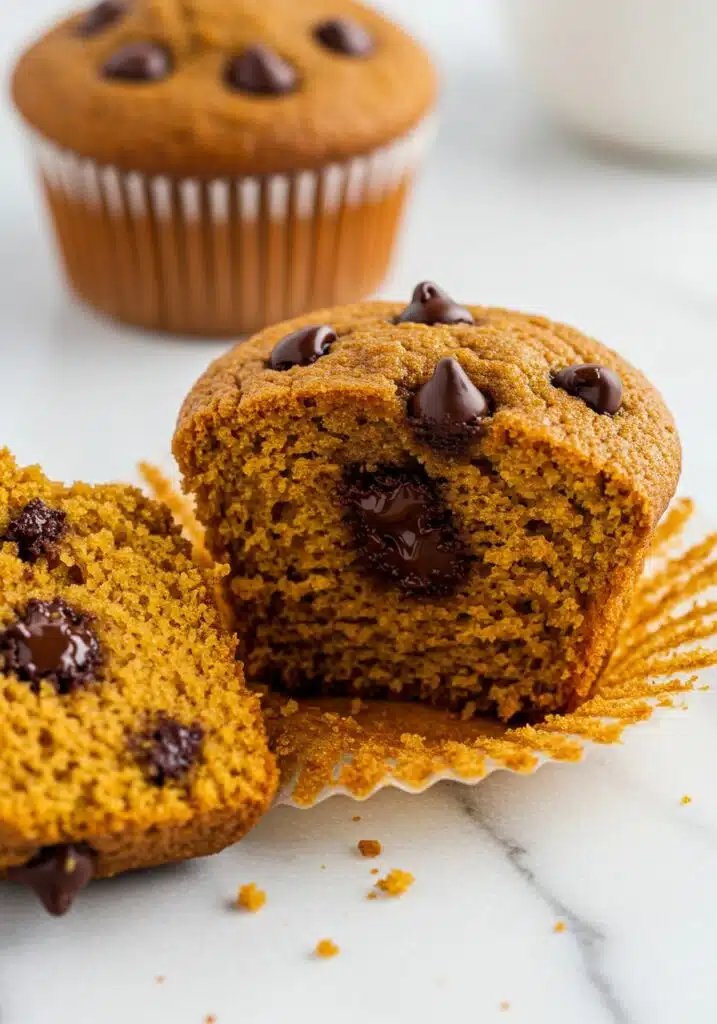
Why it matters: we all know how frustrating it is when a “healthy” muffin turns out dry or crumbly. For people chasing performance, steady energy, or just a better weekday breakfast, combining oats, Greek yogurt, and protein powder gives real staying power without sacrificing taste. Let’s be real, flavor wins, but protein keeps you going.
Ingredients You’ll Need for High Protein Pumpkin Muffins
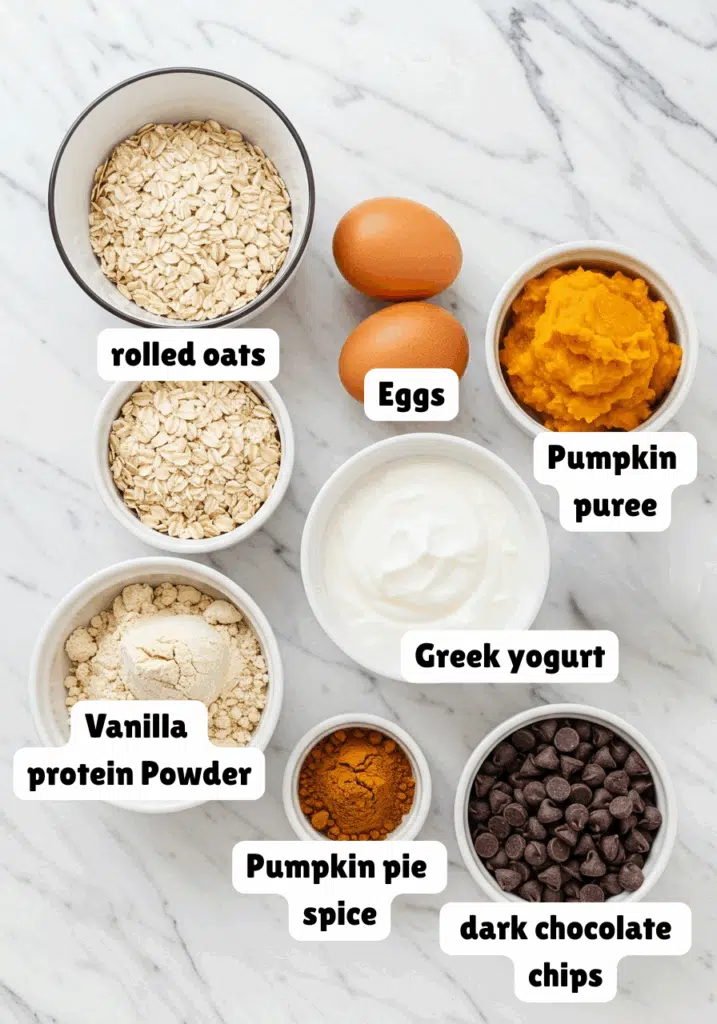
This ingredients section explains what each component does and why it’s in the recipe, then lists exact amounts so you can jump straight to baking. The oat flour (made from rolled oats) gives structure and fiber while keeping the muffins essentially flour-less.
Greek yogurt adds creaminess and extra protein, it also helps keep these muffins moist, which is crucial when using protein powder. Eggs bind and add lift; vanilla protein powder bumps the protein content and gives subtle sweetness when paired with pumpkin pie spice.
Pumpkin puree keeps everything tender and adds that seasonal flavor. Chocolate chips are optional but make these kid-friendly and more snackable.
If you want to swap anything, the notes below the list explain safe alternatives for common pantry situations.
Ingredients (makes 12 muffins)
- 1 cup old-fashioned rolled oats (100 g), blitz to oat flour.
- 1 cup pumpkin puree (244 g).
- 1 cup plain Greek yogurt (227 g; 0% is fine).
- 2 large eggs.
- 1/2 packed cup vanilla protein powder (~50–60 g).
- 1 tablespoon pumpkin pie spice.
- 1 teaspoon ground cinnamon.
- 1 teaspoon baking powder.
- 1/2 teaspoon baking soda.
- Pinch of fine sea salt.
- 1/2 cup dark chocolate chips (optional; use 1/3 cup in batter and sprinkle the rest on top).
Ingredient swap notes: If you need gluten free, use certified gluten-free oats. For dairy-free, a plant-based Greek-style yogurt works but may change texture slightly. No protein powder? You can increase oats and add an extra egg, but know protein per muffin will be lower. Vanilla flavor protein powder keeps sweetness balanced; unflavored works too but may need a touch of maple or honey.
Step-by-Step Instructions for High Protein Pumpkin Muffins
Below is a short paragraph describing the method, followed by a clear numbered list you can follow. This approach keeps mixing minimal and avoids over-processing the batter, which is the biggest reason protein-based baked goods go dry. Many fitness-focused home cooks say blending the oats first and not over-whipping preserves moisture and gives a light crumb. Ready to bake? Let’s go.
Method, overview in brief: Process the oats to a flour, blend with wet ingredients and protein powder until just combined, fold in chips, divide into liners, and bake. Timing is forgiving: 25 minutes = slightly moister; 30 minutes = firmer. Use a toothpick test to check doneness.
Step-by-step (numbered):
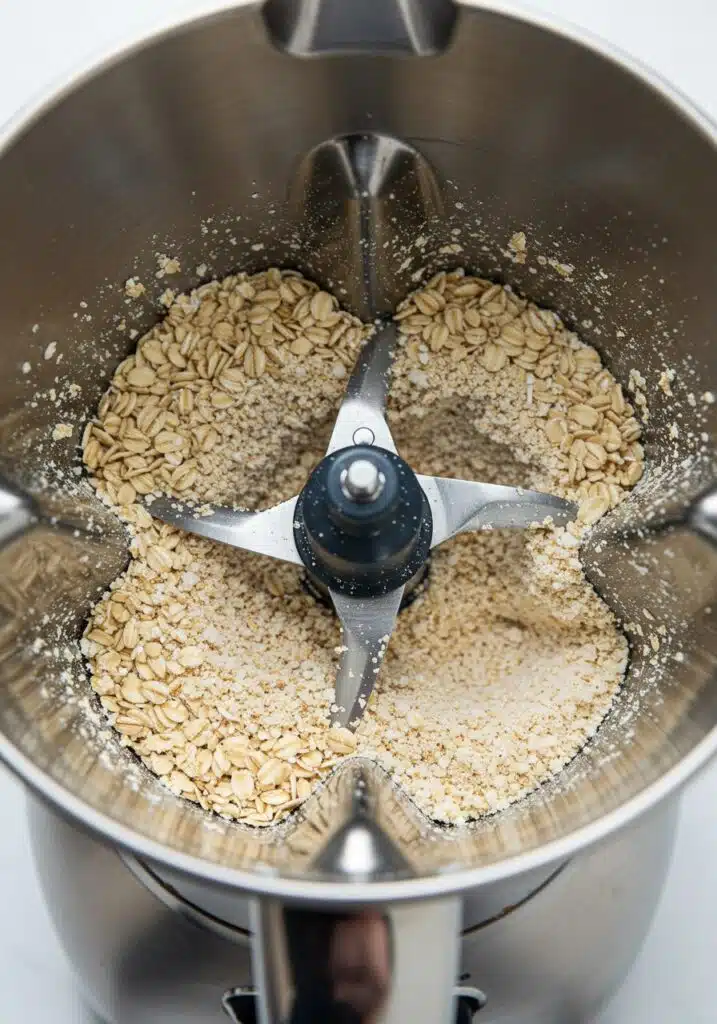
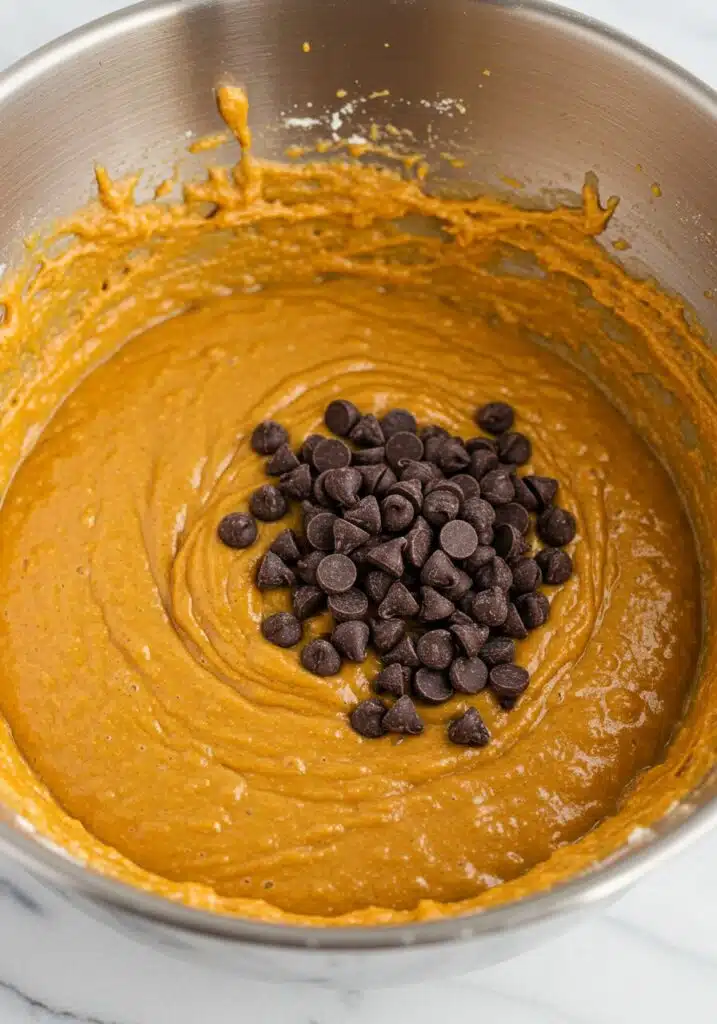
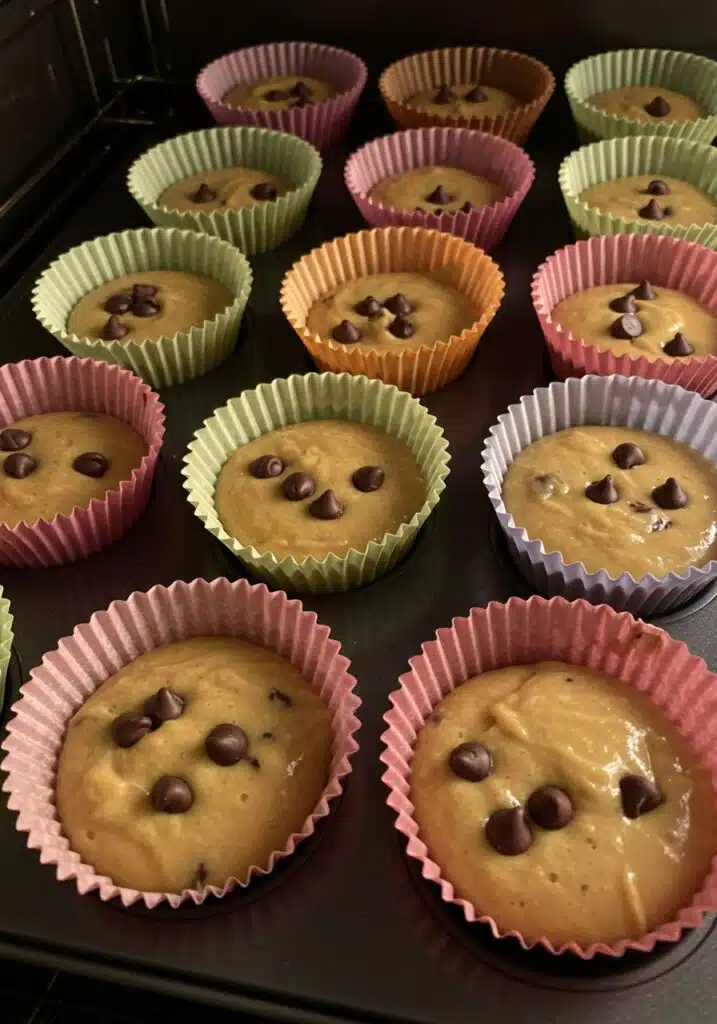
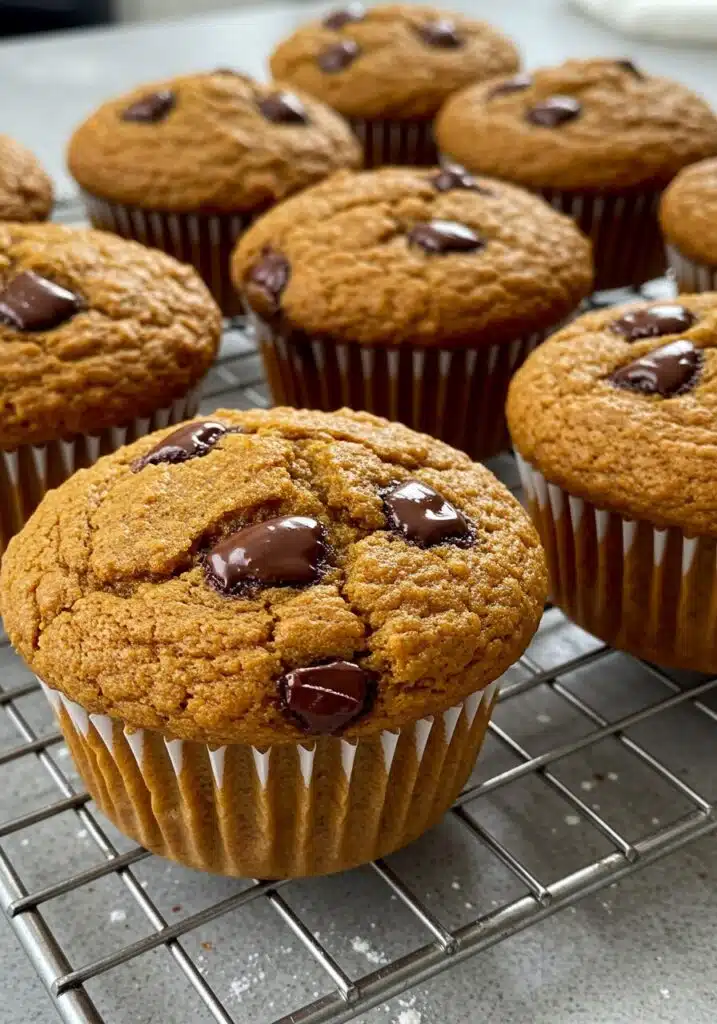
- Preheat & prep. Preheat oven to 350°F (175°C). Line a 12-cup muffin tin with silicone liners or grease regular liners lightly.
- Make oat flour. Add 1 cup rolled oats to a high-speed blender, food processor, or Vitamix. Pulse for ~20 seconds until it resembles a fine flour.
- Blend wet + dry. Add pumpkin puree, Greek yogurt, eggs, vanilla protein powder, pumpkin pie spice, cinnamon, baking powder, baking soda, and a pinch of salt to the blender with the oat flour. Pulse or blend just until combined, avoid over-blending.
- Fold in chips. Transfer batter to a bowl and stir in about 1/3 cup dark chocolate chips by hand. Pour batter into the 12 muffin cups, then sprinkle the remaining chocolate chips on top for a pretty finish.
- Bake. Bake for 25–30 minutes. Check with a toothpick: if it comes out mostly clean (a few moist crumbs okay), they’re done. For moister muffins, remove at 25 minutes; for firmer, leave to 30.
- Cool & finish. Let muffins cool in the pan for 5–10 minutes, then transfer to a rack. They firm up as they cool. Enjoy warm or room temperature.
Quick troubleshooting: If muffins are gummy in the center, bake 3–5 minutes more. If they’re too dry, reduce protein powder slightly next time or add 1–2 tablespoons of applesauce or extra yogurt. Want them sweeter? Fold in 1–2 tablespoons maple syrup before baking.
Tips for the Best High Protein Pumpkin Muffins (tricks & tweaks)
This section collects community wisdom and practical tips to make sure your high protein pumpkin muffins come out reliably great. A lot of people in the fitness community use these small tweaks to avoid the classic pitfalls of protein baking, dry texture, chalky taste, or oddly dense crumb. Let’s cover what to watch for and some flavor upgrades.
- First, protein powder choice matters. Whey generally gives a lighter crumb and blends smoothly; plant-based powders can be slightly denser and may need a touch more moisture. If using plant protein, try a mix of pea + rice or a blended vegan protein for nicer texture. For vanilla protein powder, less added sugar is needed; with unflavored or natural protein powders, consider 1–2 tbsp maple syrup or a mashed banana to balance taste.
- Second, don’t overprocess the batter. Over-blending develops gluten from the oat flour and squeezes out moisture. Pulse until just mixed. Folding chocolate chips by hand preserves air and prevents them from breaking down. Third, temperature and pans matter. Silicone liners make removal easy and are forgiving for moist batters; metal pans give crisper edges. If using a dark muffin tin, shave 1–2 minutes off baking time.
- Storage and meal-prep tips: cool completely, then store in an airtight container. Because these include eggs and yogurt, refrigerate within two hours; they’ll keep 4–5 days in the fridge or up to 3 months in the freezer. Reheat frozen muffins in a toaster oven or microwave for 20–30 seconds.
If you’re exploring Greek-yogurt uses and swaps, this flatbread piece has useful yogurt tips.
Want to dig deeper into protein needs and timing? The Harvard T.H. Chan School of Public Health provides a helpful primer on protein sources and balance.
And for ingredient nutrition facts (pumpkin, yogurt, etc.), USDA FoodData Central is a great reference.
Nutrition Information & Storage for High Protein Pumpkin Muffins
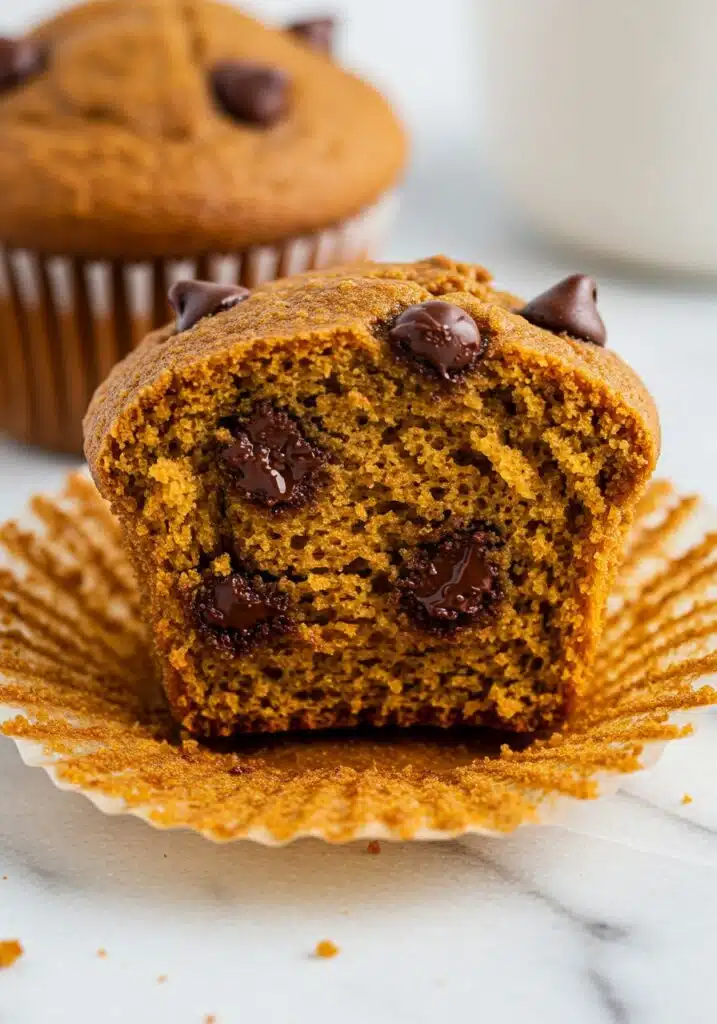
This section gives the per-muffin nutrition snapshot provided with the recipe and practical storage and safety notes. Having accurate nutrition at hand helps people plan breakfasts, snacks, or post-workout fuel without guesswork. Per the pumpkin protein muffins formulation, each muffin is approximately 122 kcal with 7 g protein, 15 g carbohydrates, 6 g fat, and 3 g fiber.
Those numbers make these muffins a solid, lower-calorie, protein-forward snack compared with standard bakery muffins. They provide vitamin A from pumpkin and a little potassium and iron as well.
Because the recipe uses Greek yogurt and eggs, handle leftovers like other perishable baked goods. Refrigerate muffins within two hours of baking. Stored in an airtight container in the fridge, they keep well for 4–5 days. For longer storage, freeze cooled muffins in a single layer on a tray, then transfer to a freezer bag; they’ll keep up to 3 months.
To reheat, thaw overnight in the fridge and warm in a microwave for 20–30 seconds or in a toaster ove, simple and tasty.
If tracking macros, note that protein numbers will vary by protein powder brand (whey and plant proteins differ). This High Protein Pumpkin Muffins used a plant-based estimate for the nutrition panel; swapping to a whey protein with higher protein per scoop may bump the per-muffin protein by 1–2 grams. Want a bigger protein hit? Add a scoop of extra protein powder (reduce oats slightly) or serve a muffin with a side of Greek yogurt.
Variations to Try with High Protein Pumpkin Muffins
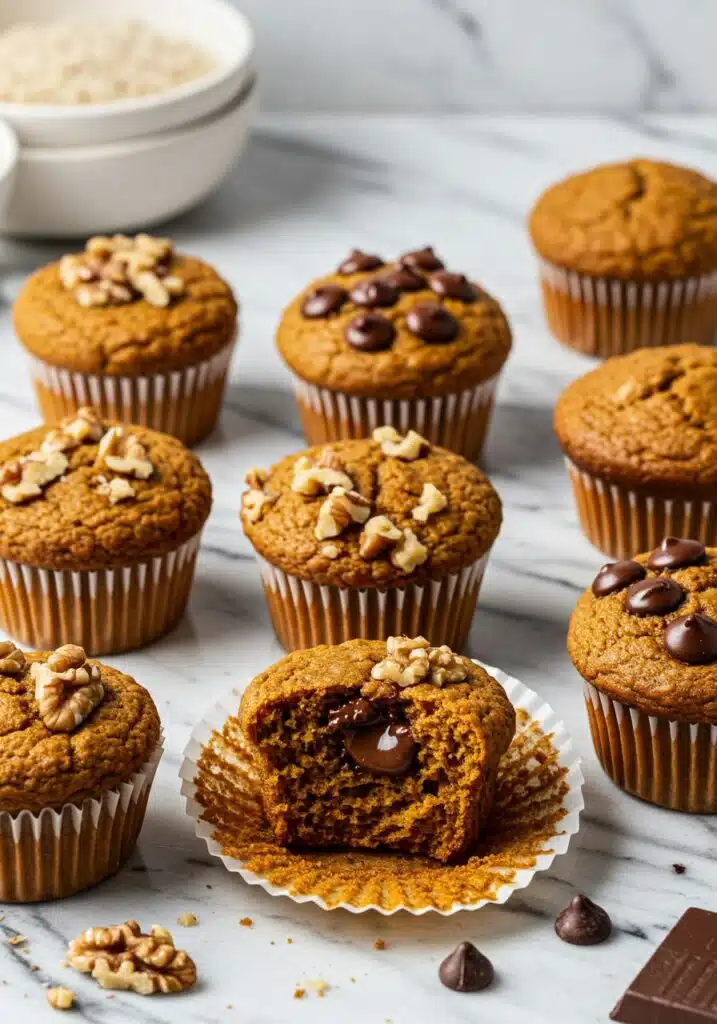
One of the best things about making high protein pumpkin muffins is how flexible they are. You can take the base recipe and tweak it to fit your taste, your pantry, or your nutrition goals. Let’s look at a few tried-and-true variations that people in the fitness and healthy baking communities love.
- Swap chocolate chips with walnuts or pecans. If you’re looking for a more wholesome crunch, nuts are a fantastic swap. Walnuts bring heart-healthy fats and a buttery texture, while pecans add natural sweetness. They also boost satiety, which makes the muffins even more satisfying as a snack.
- Make mini muffins for kids. Sometimes, little hands (and appetites) do better with smaller portions. Simply divide the batter into a mini muffin tin and bake for about 12–15 minutes instead of 25–30. Mini versions are perfect for school lunches, after-school snacks, or bite-sized pre-workout fuel.
- Add extra protein with cottage cheese or collagen. Many fitness-focused home cooks say stirring in a bit of cottage cheese keeps the texture moist while sneaking in more protein. Collagen powder is another easy add-in; it dissolves smoothly and bumps up protein without changing flavor.
- Use gluten-free oats for a GF version. If you or someone you’re baking for needs to avoid gluten, simply use certified gluten-free rolled oats. The rest of the recipe is naturally flourless, so this small switch makes your pumpkin protein muffins gluten-friendly without sacrificing taste or texture.
Small tweaks like these keep the pumpkin protein muffins fresh and versatile. Once you nail the base, don’t be afraid to experiment, the muffins are forgiving and fun to customize.
FAQs About Pumpkin Protein Muffins
When it comes to pumpkin protein muffins, a few common questions pop up again and again. Here are detailed answers based on community wisdom and food science, so you can bake with confidence.
Can I use canned pumpkin pie mix instead of puree?
It’s not ideal because pie mix already contains sugar and spices. If that’s what you have on hand, reduce the added spice blend and don’t add extra sweetener. Using pure pumpkin puree gives you more control over flavor and nutrition.
Can I make pumpkin protein muffins without protein powder?
Yes, but keep in mind the muffins won’t be as protein-dense. To keep texture balanced, you can add extra oat flour and one more egg. They’ll still be delicious, just not as high in protein.
What’s the best substitute for Greek yogurt?
Many bakers use dairy-free alternatives like coconut yogurt or almond yogurt. Just note the texture may be slightly softer. Another option is blended cottage cheese, which sneaks in extra protein while keeping muffins moist.
How long do pumpkin protein muffins last in the freezer?
Properly cooled muffins can be frozen for up to three months. Place them on a tray first, then transfer to a freezer-safe bag. When ready to eat, thaw overnight in the fridge or reheat from frozen for 30–45 seconds in the microwave.
How do I prevent dry protein muffins?
This is probably the #1 question. The trick is not to over-blend the batter and to avoid over-baking. Using whey protein powder often results in a softer crumb, while plant-based powders may need a touch more yogurt or even a tablespoon of oil for moisture.
High Protein Pumpkin Muffins Worth Baking Again
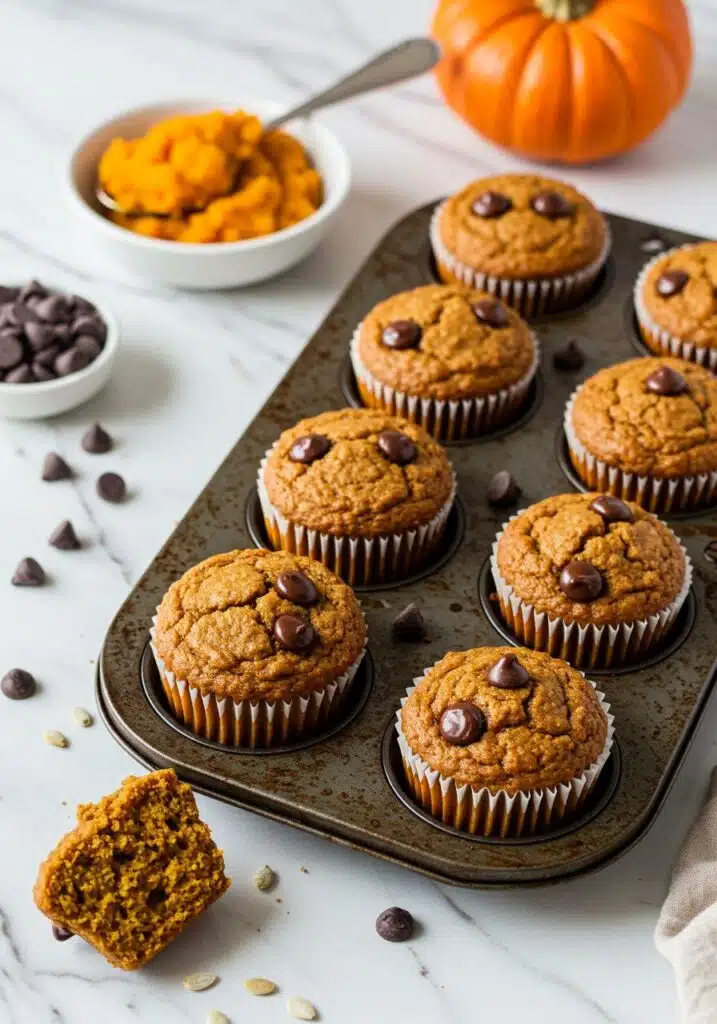
At the end of the day, high protein pumpkin muffins are more than just a seasonal treat, they’re a practical way to enjoy cozy pumpkin spice flavor while fueling your body with real nutrition. This pumpkin protein muffins was inspired by popular methods that prioritize high-protein, low-effort cooking, and the result is a batch of muffins that are moist, flavorful, and macro-friendly. Each muffin delivers a balanced mix of protein, fiber, and healthy carbs, making them a smart choice for breakfast, post-workout recovery, or even dessert.
The real beauty is in the flexibility. Swap chocolate chips for nuts, make mini muffins for kids, or go gluten-free with certified oats. Many fitness-focused home cooks also sneak in collagen or cottage cheese to bump up protein without altering flavor. We all know how frustrating it is when a “healthy” muffin goes dry or crumbly, but with the right protein powder and a few easy tricks, these muffins stay fluffy and satisfying.
try this pumpkin protein muffins , tweak it to your taste, and see how it fits into your meal prep routine. Share your version with friends or leave a tip for others, community-driven insights are how recipes like these keep improving.
Looking for more protein-packed ideas? Check out our Cottage Cheese Banana Muffins for another muffin recipe that balances flavor and nutrition. Or, if you want savory meal-prep inspiration, our High-Protein Chicken Salad is a reader favorite.
Bake once, snack smart all week, and enjoy the best of both worlds: flavor + fuel.
Print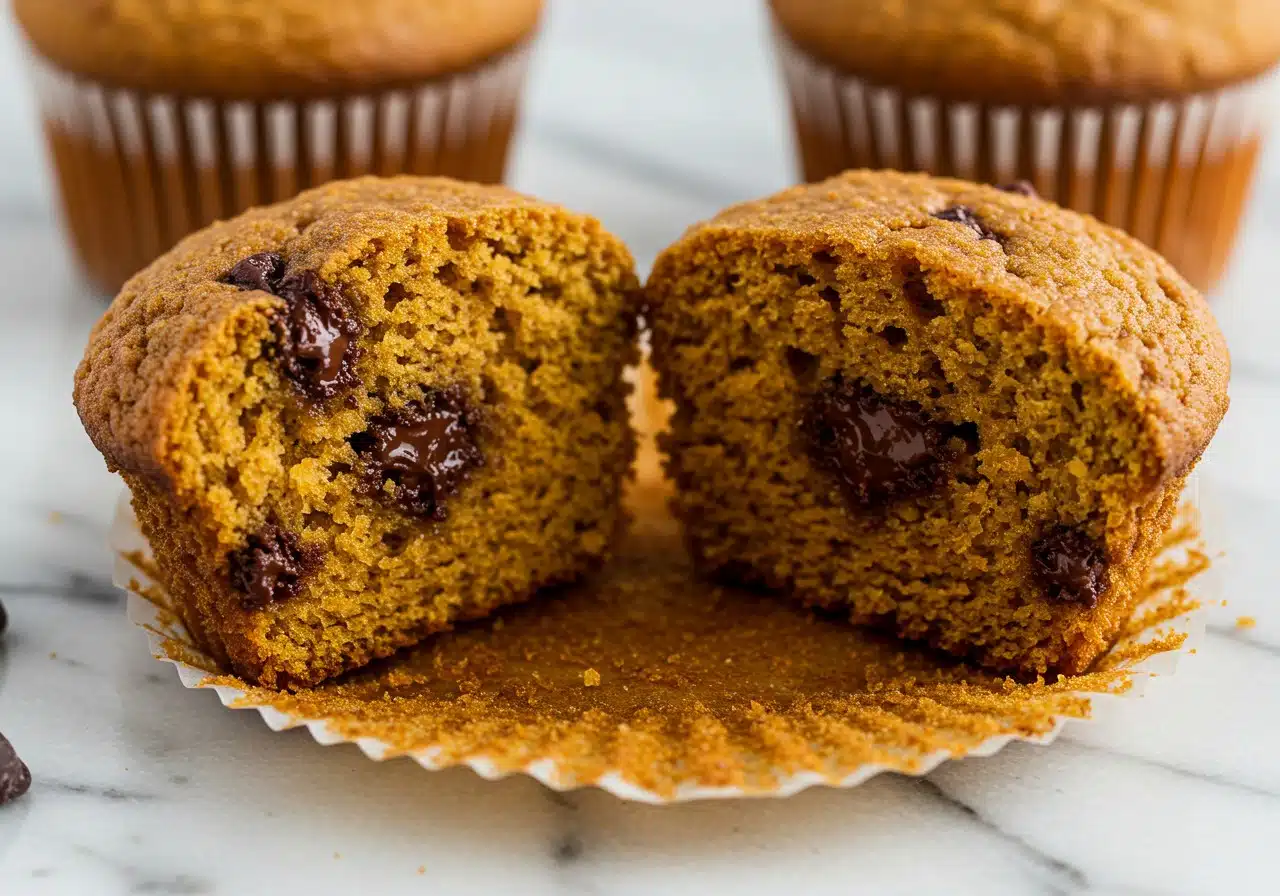
High Protein Pumpkin Muffins Recipe
- Total Time: 30 minutes
- Yield: 12 muffins 1x
Description
Protein Pumpkin Muffins are soft, high-protein, and packed with cozy fall flavor. Made right in the blender with oats, pumpkin puree, Greek yogurt, and protein powder, these muffins are a quick and healthy breakfast or snack that taste like dessert. Each one has about 7g of protein and just 122 calories, making them perfect for post-workout fuel or guilt-free snacking.
Equipment Needed
- High-speed blender or food processor (to blend oats into flour)
- 12-count muffin tin
- Silicone or paper muffin liners
- Mixing bowl and spatula (for folding chocolate chips)
- Cooling rack
- Toothpick (for doneness testing)
Ingredients
- 1 cup old fashioned rolled oats (100 grams)
- 1 cup pumpkin puree (244 grams)
- 1 cup Greek yogurt (227 grams – preferably nonfat or low-fat)
- 2 large eggs
- ½ packed cup vanilla flavored protein powder (about 50–60 grams)
- 1 tablespoon pumpkin pie spice
- 1 teaspoon cinnamon
- 1 teaspoon baking powder
- ½ teaspoon baking soda
- Pinch of sea salt
- ½ cup dark chocolate chips
Instructions
- Preheat the oven to 350°F (175°C). Line a 12-count muffin tin with silicone or paper liners and lightly grease if needed.
- Add the oats to a high-speed blender or food processor and blend for about 20 seconds until a fine flour forms.
- Add pumpkin puree, Greek yogurt, eggs, protein powder, pumpkin pie spice, cinnamon, baking powder, baking soda, and salt. Blend again until fully combined, being careful not to overmix.
- Stir in about ⅓ cup of chocolate chips by hand using a spatula.
- Distribute the batter evenly into the muffin liners, filling each about ¾ full.
- Sprinkle the remaining chocolate chips over the top of each muffin for a bakery-style finish.
- Bake for 25–30 minutes, or until a toothpick inserted in the center comes out mostly clean.
- Allow to cool in the pan for 5–10 minutes, then transfer to a wire rack to finish cooling before serving.
Notes
- Storage: Store muffins in an airtight container at room temperature for up to 2 days, or refrigerate for up to 5 days.
- Freeze: Freeze for up to 3 months. Reheat in the microwave for 20–30 seconds or thaw overnight in the fridge.
- Tip: Both whey and plant-based protein powders work for this recipe. Vanilla-flavored protein enhances the sweetness and complements the pumpkin spice.
- Pro Trick: For prettier muffins, reserve some chocolate chips to sprinkle on top before baking.
- Related Recipe: Check out our Blueberry Protein Muffins for another delicious, high-protein muffin option.
- Prep Time: 5 minutes
- Cook Time: 25 minutes
- Category: Breakfast, Dessert, Snack
- Method: Oven
- Cuisine: American
Nutrition
- Serving Size: 1 muffin
- Calories: 122
- Sugar: 5g
- Sodium: 115mg
- Fat: 6g
- Saturated Fat: 2.8g
- Unsaturated Fat: 3.2g
- Trans Fat: 0g
- Carbohydrates: 15g
- Fiber: 3g
- Protein: 7g
- Cholesterol: 46mg



I followed this recipe exactly, and these turned out great! I used a vanilla milkshake flavoured whey protein powder. The texture of the muffins is great, but they definitely lack sweetness. I would sub with semi sweet chocolate chips next time for a bit more sweetness. Will definitely make again!
Thanks for your feedback! I’m so happy to hear the texture turned out great with the vanilla milkshake-flavored protein powder! It’s always fun to try different protein flavors. I totally understand what you mean about the sweetness, depending on the protein powder, the muffins can be a little less sweet. Adding semi-sweet chocolate chips is a great idea, and will definitely enhance the sweetness while complementing the pumpkin spice flavor. You could even try a little extra cinnamon or a touch of vanilla extract next time if you’re looking to boost the flavor even more. Thanks for sharing your thoughts, and I’m so glad you’ll be making them again!